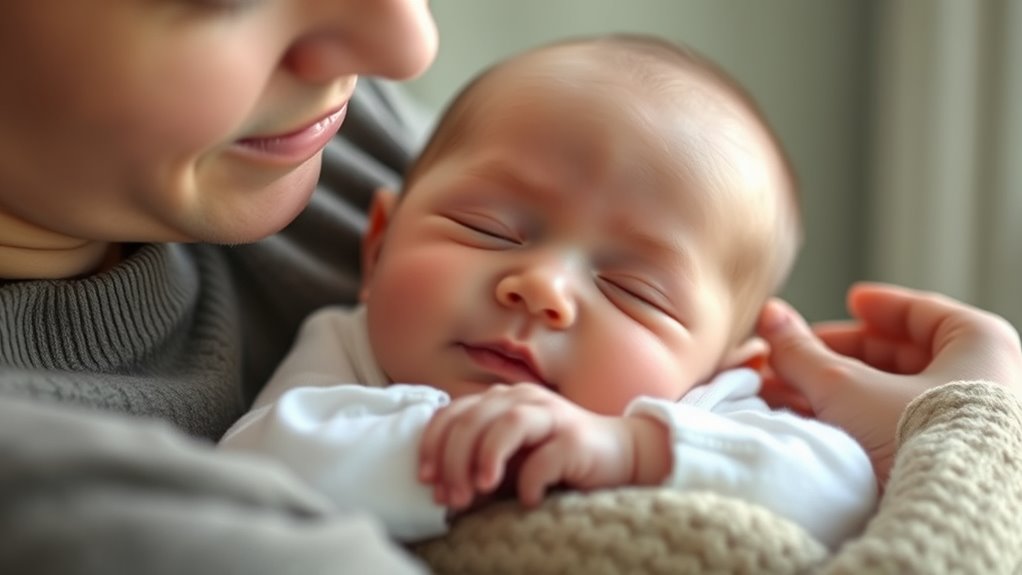Loving and holding your baby frequently doesn’t spoil them; it helps build essential emotional security and trust. Responding promptly to their needs with gentle contact promotes healthy attachment, which supports their emotional and social development. Many worry about overdoing it, but consistent, loving touch actually fosters confidence and exploration. If you want to understand more about why responsive holding benefits your little one and how it supports their growth, keep exploring these important insights.
Key Takeaways
- Frequent, loving contact does not spoil babies; it builds trust and emotional security.
- Responsive holding supports brain development, emotional resilience, and healthy attachment.
- Overdoing it is a myth; consistency in loving care fosters independence and exploration.
- Holding your baby often teaches them that their needs will be met, strengthening trust.
- Creating a calm, organized environment complements physical closeness and enhances developmental benefits.

Holding a baby can seem simple, but it’s an activity that requires care and understanding. When you hold your infant, you’re doing more than just keeping them warm and comforted; you’re fostering a essential connection that impacts their attachment security and overall development. Many parents worry that holding their baby too much might spoil them, but the truth is, responsive and loving contact actually promotes healthy emotional growth. Babies thrive on physical closeness because it helps them feel safe and loved, laying the groundwork for secure attachment. This attachment security isn’t just about feeling loved; it influences how your child manages stress, forms relationships, and navigates the world as they grow. The more responsive you are through holding, cuddling, and gentle touch, the more your baby learns they can trust you to meet their needs. This trust builds a secure foundation that supports their emotional resilience and social skills later in life.
From a developmental perspective, holding your baby offers numerous benefits. It’s not just about emotional bonding; physical contact can also stimulate brain development. When you hold your infant, you provide sensory input that promotes neural connections, aiding in their cognitive growth. It can also help regulate their body temperature, heart rate, and breathing, creating a sense of stability and comfort. This physical closeness encourages your baby to explore their environment with confidence because they know they can return to your arms for reassurance. It’s important to remember that holding your baby doesn’t mean you’re spoiling them; instead, it’s fostering their emotional security and providing essential developmental benefits. Additionally, wall organization systems can be employed in nurseries to keep essentials within reach, supporting a more organized and calming environment for both parents and babies.
Many new parents worry about overdoing it, but the key is responsiveness. If your baby cries, responding with holding and soothing helps them learn that their needs will be met. Over time, this consistent care builds trust, which is the foundation of secure attachment. As your child grows, this secure attachment can translate into independence because they feel secure enough to explore the world, knowing they can always come back to you for comfort. Holding your baby frequently and lovingly isn’t just a matter of comfort; it’s an investment in their emotional and developmental health. So, go ahead and hold your little one often—your love and physical presence are powerful tools that shape their future in profound ways.
Frequently Asked Questions
Can Excessive Holding Hinder a Baby’s Independence?
Excessive holding doesn’t hinder your baby’s independence; instead, it supports healthy temperament development. When you hold your infant often, you foster secure attachment, which builds confidence and emotional resilience. While parental stress can arise from constant caregiving, balancing affection with healthy boundaries helps your baby feel safe and loved. Remember, nurturing through holding encourages independence over time, as your baby learns trust and security from your consistent, loving presence.
Is There a Limit to How Much a Baby Should Be Cuddled?
There’s no strict limit to how much you should cuddle your baby, as it varies by cultural differences and parenting styles. Some cultures emphasize constant closeness, while others encourage independence earlier. Trust your instincts and observe your baby’s cues. If they seem content and secure, your loving cuddles aren’t a problem. Remember, showing affection builds trust and emotional security, so hold them close as much as needed to nurture their well-being.
Does Holding a Baby Too Often Cause Attachment Issues?
Imagine holding your baby as a warm, steady lighthouse guiding them safely through stormy seas. Holding your infant often fosters secure attachment, boosting emotional regulation. Concerns about attachment issues due to frequent holding are unfounded; babies thrive with consistent comfort. While sensory overstimulation can happen, gentle cuddling helps your child develop trust and resilience. Your love, shown through touch, lays a strong foundation for their emotional health.
How Can Parents Balance Affection and Independence?
Balancing affection and independence involves understanding attachment styles and developmental milestones. You should respond warmly to your baby’s needs to foster secure attachment, but also encourage independence by offering age-appropriate challenges. As your child hits milestones, gradually introduce more autonomy while maintaining consistent support. This approach helps your little one develop confidence and healthy relationships, ensuring they feel loved and secure without becoming overly dependent.
Are There Signs That a Baby Is Overly Spoiled by Love?
Imagine a baby who constantly expects to be held and comforted, even as they grow older. If a baby shows difficulty calming themselves or struggles with emotional resilience, they might be overly spoiled by love. Such behaviors can also hinder their social skills, making independence tough. While loving touch is essential, observing these signs helps guarantee you nurture balanced emotional growth without unintentionally creating dependence.
Conclusion
So, don’t worry about holding your baby too much. Your love and comfort are the foundation they need to thrive. Holding them close isn’t spoiling them; it’s building trust and security. Remember, you’re their safe harbor in a stormy world. Keep showing up with open arms and a loving heart. In the end, it’s these precious moments that shape their world—because when you nurture your baby, you’re giving them roots to grow and wings to fly.










